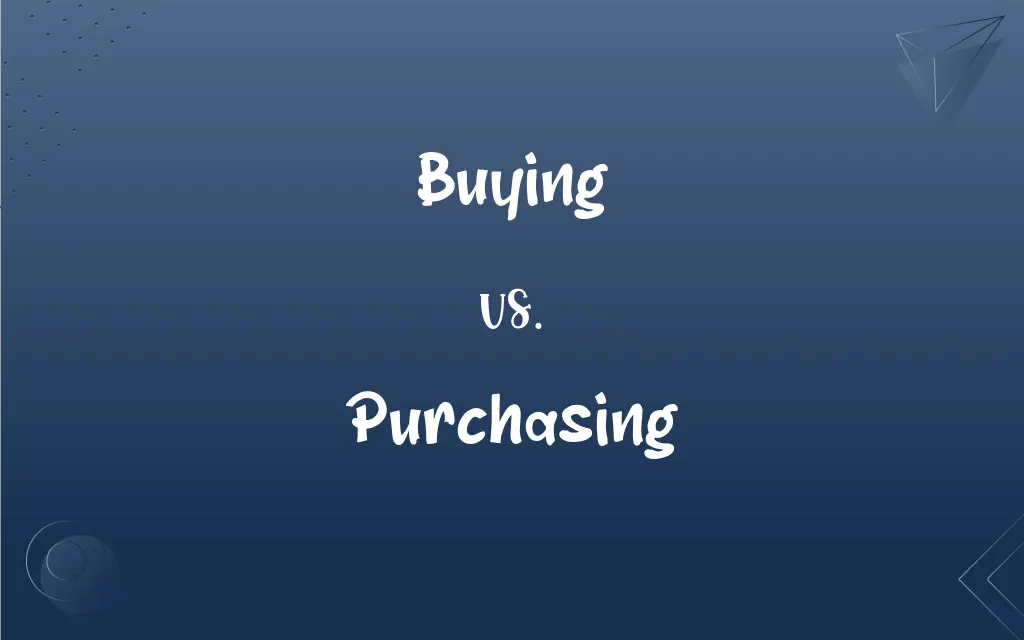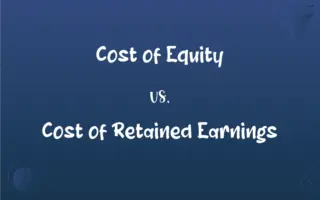Buying vs. Purchasing: What's the Difference?
Edited by Aimie Carlson || By Janet White || Published on December 11, 2023
Buying and purchasing both mean acquiring something in exchange for payment, but purchasing is often used in more formal, business, or legal contexts.

Key Differences
Buying is a common term used in everyday language when referring to the act of acquiring goods or services in exchange for money. Purchasing, while essentially meaning the same, is often used in more formal or business contexts and may imply a more deliberate or planned acquisition.
When someone talks about buying, it often relates to personal, everyday transactions, like buying groceries or clothes. Purchasing, on the other hand, is frequently used in the context of business or large transactions, such as purchasing equipment for a company or acquiring assets.
The term buying is typically used in a casual tone. Purchasing, due to its more formal connotation, is often found in business literature, legal documents, and in the context of official policies and procurement processes.
In many cases, buying is a straightforward transaction with minimal formal documentation. Purchasing, especially in a business setting, often involves a process that includes documentation, approval, and a more formal procurement procedure.
In daily conversation, buying is perceived as a simpler, more immediate act. Purchasing might imply a more thought-out and significant transaction, often carrying a sense of greater importance or scale.
ADVERTISEMENT
Comparison Chart
Context
Everyday, casual
Formal, business-oriented
Scale
Personal, small-scale transactions
Larger, business transactions
Connotation
Casual, immediate
Formal, planned
Process
Simple, direct
May involve formal procedures
Usage
Common in daily conversation
Common in official, legal contexts
ADVERTISEMENT
Buying and Purchasing Definitions
Buying
Buying is frequently used for personal purchases.
He's thinking about buying a new phone.
Purchasing
Purchasing refers to the formal act of buying something.
The company is purchasing new software.
Buying
Buying implies an immediate exchange of goods for money.
Buying a ticket at the cinema is quick.
Purchasing
Purchasing is often used in business contexts.
The purchasing department handles procurement.
Buying
Buying means acquiring something in exchange for money.
She enjoys buying vintage clothes.
Purchasing
Purchasing can involve a documented process.
Purchasing real estate requires legal paperwork.
Buying
Buying is a common consumer activity.
Online buying has increased significantly.
Purchasing
Purchasing is used in official procurement policies.
Government purchasing procedures are strict.
Buying
To acquire in exchange for money or its equivalent; purchase. See Note at boughten.
Purchasing
Purchasing implies a more strategic or significant acquisition.
They are considering purchasing a competitor.
Buying
To be capable of purchasing
"Certainly there are lots of things in life that money won't buy" (Ogden Nash).
Purchasing
To obtain in exchange for money or its equivalent; buy.
Buying
To acquire by sacrifice, exchange, or trade
Wanted to buy love with gifts.
Purchasing
To acquire by effort; earn
Purchased the victory with the loss of many lives.
Buying
To bribe
Tried to buy a judge.
Buying
(Informal) To accept the truth or feasibility of
The officer didn't buy my lame excuse for speeding.
Buying
To purchase something; act as a purchaser.
Buying
Something bought or for sale; a purchase.
Buying
An act of purchasing
A drug buy.
Buying
Something that is underpriced; a bargain.
Buying
Present participle of buy
Buying
The act of making a purchase.
Buying
The act of buying; as, buying equipment for the trip took several hours.
Buying
The act of buying;
Buying and selling fill their days
Shrewd purchasing requires considerable knowledge
Buying
Buying often implies a casual, everyday transaction.
Buying groceries is a weekly routine for him.
FAQs
Do businesses use the term buying?
Yes, but often prefer purchasing.
Can buying involve negotiation?
Yes, particularly in personal transactions.
Is buying a legal term?
Less so than purchasing.
Is buying only for physical goods?
No, it can include services.
Can buying be impulsive?
Yes, it often is less planned.
Does purchasing always involve contracts?
In business settings, usually.
Is purchasing only for large amounts?
Often, but not exclusively.
Can individuals use the term purchasing?
Yes, but it's less common.
Are purchasing decisions usually documented?
Yes, especially in businesses.
Do you need approval for buying?
Not usually in personal contexts.
Is buying used in everyday language?
Yes, it's very common.
Can buying involve research?
Yes, though it's often less extensive than purchasing.
Can purchasing be for personal use?
Yes, but it’s less common.
Is purchasing linked to procurement?
Yes, particularly in organizational contexts.
Is purchasing more strategic?
Typically, it involves more planning.
Can buying be done online?
Yes, it's common in e-commerce.
Is buying a quick process?
It can be, depending on the context.
Does purchasing imply a budget?
Often, especially in businesses.
Does purchasing involve multiple parties?
Often, especially in corporate settings.
Is purchasing a formal procedure?
In many cases, yes.
About Author
Written by
Janet WhiteJanet White has been an esteemed writer and blogger for Difference Wiki. Holding a Master's degree in Science and Medical Journalism from the prestigious Boston University, she has consistently demonstrated her expertise and passion for her field. When she's not immersed in her work, Janet relishes her time exercising, delving into a good book, and cherishing moments with friends and family.
Edited by
Aimie CarlsonAimie Carlson, holding a master's degree in English literature, is a fervent English language enthusiast. She lends her writing talents to Difference Wiki, a prominent website that specializes in comparisons, offering readers insightful analyses that both captivate and inform.






































































